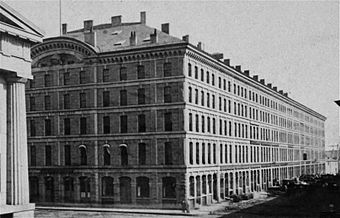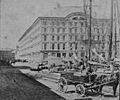State Street Block (Boston) facts for kids
Quick facts for kids |
|
|
State Street Block
|
|
|
U.S. Historic district
Contributing property |
|

State Street Block, Boston, ca. 19th c. (Custom House at left edge)
|
|
| Location | 177-199 State Street Boston, Massachusetts |
|---|---|
| Built | 1858 |
| Architect | Gridley James Fox Bryant |
| Architectural style | Italianate |
| Part of | Custom House District (ID73000321) |
| Designated CP | May 11, 1973 |
The State Street Block is an old building in Boston, Massachusetts. It was built in 1857 and is made of strong granite stone. You can find it near the water in Boston's busy Financial District. A famous architect named Gridley James Fox Bryant designed it.
Back in the 1850s, a company called Long and Central Wharf Corporation owned the land. They sold parts of the building to different people. But there was a rule: everyone had to buy the same type of granite from the company. This made sure the building looked uniform and followed the architect's original plan.
A Building People Loved
Many people were impressed by the State Street Block when it was new. In 1860, the famous writer Walt Whitman visited Boston. He wrote about the building, calling it "Noblest of all State Street Block." He also said it was "probably one of the finest pieces of commercial architecture in the world."
Another visitor in 1859 described it as "a magnificent block." These comments show how special the building was considered in its time.
Changes Over Time
The State Street Block has changed a lot since it was first built. In the middle of the 1900s, a large part of the building was removed. This happened to make space for a big highway project called the Central Artery.
Because of this, nearly three-quarters of the original building was lost. Even the roofline of the remaining part was changed.
A Historic Landmark
Even though much of the building was removed, the part that remains is still important. In 1973, the surviving section of the State Street Block was added to the National Register of Historic Places.
It became part of the Custom House District, which is a special area recognized for its history. This helps protect the building and reminds us of its past importance in Boston.
Images for kids
 | Lonnie Johnson |
 | Granville Woods |
 | Lewis Howard Latimer |
 | James West |






